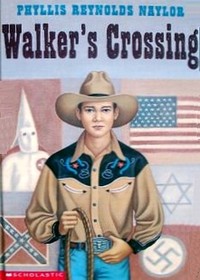From Library Journal
Grade 6-8-Ryan Walker is the middle son of a Wyoming ranching family, cast in the shadow by his charismatic if aimless older brother, Gil. Ryan longs to be a rancher, but his pure love of the West is tested when the white-supremacist Mountain Patriots Association begins to harass a local family. When his best friend follows his parents' strict racial prejudices, Ryan is stunned to find blatant racism in his school and town. He must struggle to discern fact from slander, the importance of emotional ties, and the fine line between teasing and cruelty. Naylor has written a gripping testament to the basic, if little-exercised, freedoms of those in the United States, freedoms that must intrinsically be balanced with tolerance. Ryan gradually discovers the maturity that comes from accepting that one's beliefs and values can differ from those of friends and family. Casual cruelty and racism of the children and adults in the area is competently portrayed, while a teacher's delightfully calm encouragement of violently opposing views in her classroom is satisfying if unrealistic at times. Ryan's solemn father, convinced that his older son's beliefs are a phase, occasionally seems ill cast against the boys' racist mother. The nature of the story requires the included racially offensive language and violence, which is occasionally shocking. An exciting, important study of the need for individuals to claim and defend their beliefs while defending the freedoms of others as well.
Grade 6-8-Ryan Walker is the middle son of a Wyoming ranching family, cast in the shadow by his charismatic if aimless older brother, Gil. Ryan longs to be a rancher, but his pure love of the West is tested when the white-supremacist Mountain Patriots Association begins to harass a local family. When his best friend follows his parents' strict racial prejudices, Ryan is stunned to find blatant racism in his school and town. He must struggle to discern fact from slander, the importance of emotional ties, and the fine line between teasing and cruelty. Naylor has written a gripping testament to the basic, if little-exercised, freedoms of those in the United States, freedoms that must intrinsically be balanced with tolerance. Ryan gradually discovers the maturity that comes from accepting that one's beliefs and values can differ from those of friends and family. Casual cruelty and racism of the children and adults in the area is competently portrayed, while a teacher's delightfully calm encouragement of violently opposing views in her classroom is satisfying if unrealistic at times. Ryan's solemn father, convinced that his older son's beliefs are a phase, occasionally seems ill cast against the boys' racist mother. The nature of the story requires the included racially offensive language and violence, which is occasionally shocking. An exciting, important study of the need for individuals to claim and defend their beliefs while defending the freedoms of others as well.
A boy is faced to choose between the bigotry his family feels and the truth he wants to stand up for.




